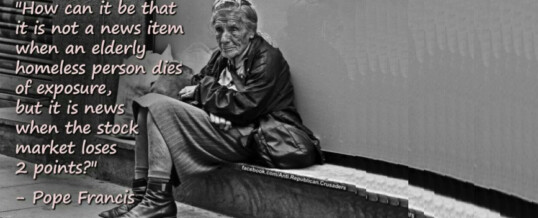
Here is a line from the sacramentary (big, red book on the altar from which the priest prays the Eucharistic prayer) that I have publicly prayed numerous times over the past 23 years without giving it the attention it deserves. It goes like this; notice the last part especially. “Therefore, as we celebrate the memorial of his Death and Resurrection, we offer you, Lord, the Bread of Life and the Chalice (Cup) of salvation, giving thanks that you have held us worthy to be in your presence and minister to you”.I have no doubt we are in the presence of God, the Holy One, when we gather for Eucharist. Moreover, Jesus says, “Where two or three are gathered in my name (with or without Eucharist), I am with you” (Mt. 18:20).
But what about the “minister to you” part? How do we minister to God? I suppose we minister to God by offering up our thanksgiving at Mass for the gift of his Son, Jesus, and for all that God has done for us and continues to do for us. That is a start, but just a start. I believe the “you” in the “minister to you” refers to all the people God has put on my path that I have loved or failed to love after all, “I was hungry and you gave me something to eat…or you didn’t.” That’s the rub. Receiving Communion, the Body of Christ, at Mass is easy. However, loving the “Body of Christ,” in my fellow human being is not so easy.
The Church’s greatest missionary, St. Paul (a.k.a. “Saul” before his conversion), was super religious, or as we might say, more-Catholic-than-the-pope. (Know anybody like that?) While in the process of arresting Christians, he is struck by a light from heaven and hears a voice saying: “Saul, Saul, why are you persecuting me?” Curious, Paul has never seen Jesus, yet he is being accused of persecuting Christ. Paul answers: “Who are you?” The answer comes: “I am Jesus, whom you are persecuting.” The historical Jesus and the body of believers are identified as a single entity. Because he is blinded, he has to be led by the hand to Damascus to learn what to do next not only from God above but also from the Christian community below.
This is the beginning of conversion for Paul and for us. This is the beginning of putting faith into action for Paul and for us. This is the same Paul who will later write to the Church in Corinth: “If a person eats and drinks (the Eucharistic Body and Blood of Jesus) without recognizing the body (our fellow human beings), that person is eating and drinking their own condemnation” (1 Cor. 11:28-29). There is only one Body. We believe this in our heads but act like there are two bodies: the quiet, always-affirming Body of Christ tucked away in a tabernacle and the Body of Christ who makes demands of my time, energy, and money. Christianity is not an escape religion but an engaging religion. We are called to engage the world and love it on its own terms, not ours. Sr. Sue Mosteller, who led a parish mission at Immaculate Heart of Mary some 15 years ago, says it this way in her book, Body Broken, Body Blessed: “It is mysterious how the blessed body of family or community, which so powerfully binds us together for growth, maturation, and independence, is at the same time the broken body that permanently wounds us, breaking our hearts and our capacity for fulfillment. If we are to change for the better, or if we are to change the world, there is a certain coming-to-terms with this mysterious contradiction!” So true. Sue is under no illusions about how difficult it can be to love the Body of Christ in our brothers and sisters. In the same line of thought, the late Louis Evely writes: “You must swallow all your brothers and sisters with the host of your communion. You cannot separate Christ from His Body.”
Fr. Phil
SEP
2020

About the Author: